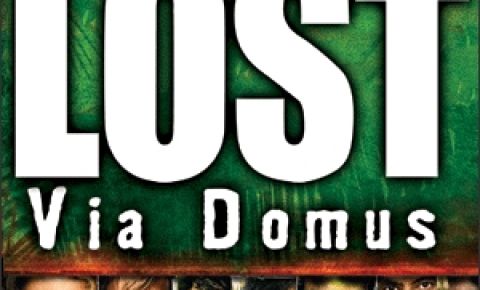I must admit that I am a huge fan of the Lost series and ever since I saw the first episode I hoped that one day I would be able to live and enjoy a similar experience. Since plane crashes and most of the things that happen in the television series are completely out of my league, I found Ubisoft's decision to work together with ABC the best thing that could've happened. Still, I knew that no single game created after a Hollywood flick was ever worthy of any kind of praise, so I was afraid Lost will be ruined, together with my dreams.
Fortunately, Ubisoft managed to develop Lost: Via Domus without ruining a great concept. Unfortunately, they were unable to create a great game (maybe not even an above-average one). Lost: Via Domus can and should be played only by Lost fans and the more hardcore you are, the better. People who have no idea what Lost is will probably quit after a short while, frustrated and wondering what was that game about.
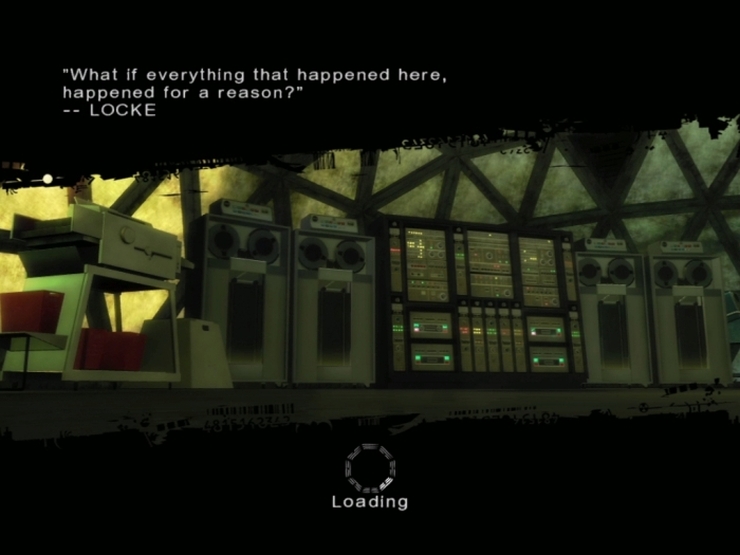
The Story
The story unfolds as you play, Lost: Via Domus bringing you a mixed experience from the first two seasons of the TV show. And I say mixed in a good way: while everything in the game happens following the same timeline and series of events as seen on TV, you will also get a brand new and exciting story that fits perfectly with what you already know. It really is a "Lost" story.
You are Elliot, a passenger on Oceanic Airlines flight 815 that never appeared in the TV series. You are a photographer/journalist that lost his memory after the crash and, of course, you want it back. But there is a little problem: one of the pictures you took before boarding the plane was so important that somebody decided to follow you, get your camera, destroy the film and kill you afterwards. Unfortunately, the guy survived the crash, too, so your first quest will be to solve this problem.
Basically, using all the Lost goodies like flashbacks combined with things you discover or happen on the island, your job will be to make Elliot remember - and everything in just 7 episodes that last as much as 7 real episodes would, without the commercial breaks. And that is one of the biggest drawbacks of the game: you'll love the story from the second you'll start playing, just to find out that everything ends prematurely. Still, a great story, no matter how long it lasts.
Gameplay
You press the "Play the game" button, an auto updater runs quickly and the game starts: the Ubisoft logo, then the ABC logo, then a new screen announcing "Ubisoft presents"? and a loading screen! You would be tempted to say "So what, stupid?" since this doesn't seem to have anything to do with the game but, after some thirty minutes you have spent with the game, you'll know what I mean. Loading screens are everywhere, sometimes taking longer than the amount of time you've spent playing since the last loading screen. And this is something I would call absolutely frustrating.
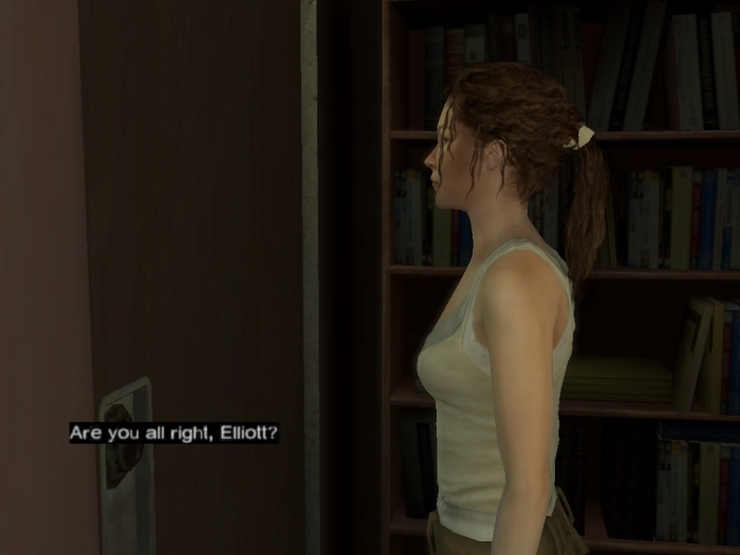
And these won't be your only problems: another upsetting thing is that you are not able to skip the cutscenes. I have nothing against them since they are, indeed, really well done and not watching them would totally ruin the game's overall experience but having in mind that you can die, do something wrong or just feel the need to start over, it's pretty annoying. Watching the same thing again and again might eventually add up to the total play time, making you believe that Lost: Via Domus is actually a longer game, but it is boring. And boring combined with games is always a bad thing. Blah.
Still, there are some really interesting concepts Lost: Via Domus comes with. Or, to be fair, it borrows some great concepts from the TV series and brings them to us. As I've already said, the story is divided into two pieces: what happens to Elliot on the island and what happened to him before the crash. This later part, the "regain memory" one, is made via flashbacks that are meant to make you remember all sorts of things. You are presented with a shredded picture for just a few seconds and then a short sequence keeps playing in the blurry flashback, while you try to take the exact same photo. It is really interesting and does keep you wanting for more, but the fact that you have to take exactly the same shot, combined with the unskipable cutscenes is a pain in the arse (yes, you will think 3-4 times that "maybe" you took the right picture and you will be wrong!). Hell, I almost smashed the mouse to the ground after taking about 50 pictures on the beach, in the first flashback.
While you gain puzzle pieces from your past, you'll still have to survive on the island and perform various quests or tasks. Unfortunately, everything is quite linear and everything seems scripted and bound to happen exactly as the developers wanted it to happen. Yeah, I know it's something natural, but at least 2-3 other ways of doing it would've been great. Not to mention the fact that the "open world" concept does not exist in the developers' vocabulary. And please tell me: why can't you just take a break for a few minutes, jump in the ocean and just swim?!? Yes, I know, the devs didn't want you to.
And since I've mentioned the "various" quests, I should make one thing clear: after finishing the game you'll get the impression that you are already the best electrician in the world. That's because you will have to do over and over again the same "connect the fuses" minigame or puzzle when you'll have to power up stuff on the island. And, man, that's one of the most boring things! Of course, as it happens with the cutscenes and everything else, these are probably just some artificial means to make the game seem a bit longer.
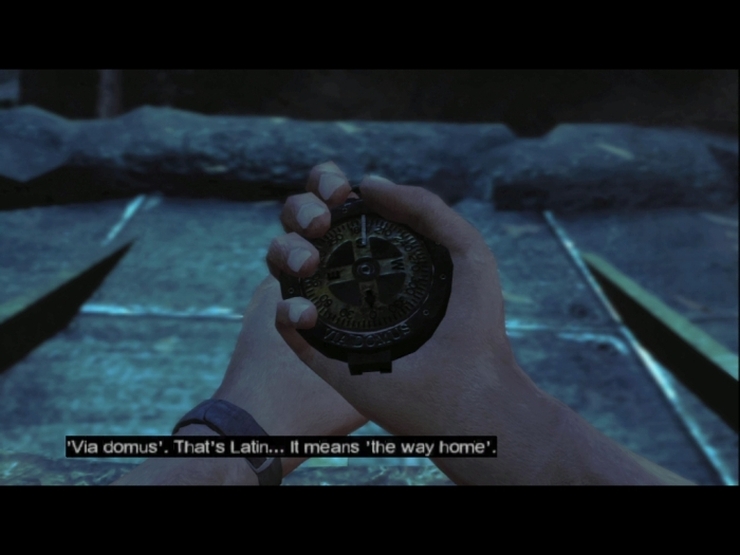
On the other hand, the controls work pretty well, the shooting sequences won't make you feel like putting a bullet in your head and you'll basically get used to everything in a few seconds. You will still get stuck in front of a tree or a piece of plane, but nobody is perfect. And this might be a good thing after all, since getting stuck might sometimes reveal some goodies: water bottles, coconuts or other fruit and all of these have a "monetary" value in the game, offering you the option to trade with the other characters. Even though this could've been a bonus to the gameplay and the overall experience, spicing things up, it barely manages to do so since you will probably trade for nothing else but "light".
Still, the island is pretty big and, thankfully, Ubisoft created an useful navigation system that will "teleport" you to different locations via signs or flags and, of course, loading screens. And that's good since running through the forest will only bring you a few fruits and nothing more (there are moments when the devs felt the need to make the forest feel more alive, but these are the same moments when you can't "jump" from one place to another).
As I said, there are seven episodes in the game and they really manage to give you the feeling you're actually a star of the TV series. Every episode begins with a quick and very well done "Previously on Lost" intro, then the logo follows and you are excited between the never-ending loading screens. But, generally, this excitement will quickly fade away.
Graphics and Sound
A really upsetting thing regarding Lost: Via Domus is the voice acting. Although it is extremely well done, you won't hear anything but sound-alikes (and you won't hear them all the time either, since there are a few lines that were not recorded). And yes, the actors in the game really? sound like the real ones but if you're a Lost fan, you'll feel the difference and you'll be a little disappointed. After all, it is a licensed game and it really should have the real voices. Oh, and since we're on the right topic - somebody please shoot Locke! His voice is horrible (the character's one, that is).
The visual design is outstanding. Ubisoft really managed to re-create the Lost universe in the game and they should be congratulated for that. Everything is exactly as you've seen on TV, every little object is very detailed and looks great. The main characters look pretty much like the actors we all know and this is a fact that adds more to the feeling that you're actually part of the series and not playing the video game. In fact, you might be tempted to think that the developers spent more time creating the universe and shaping the faces and bodies, than working on the game. And that's not exactly a good thing.
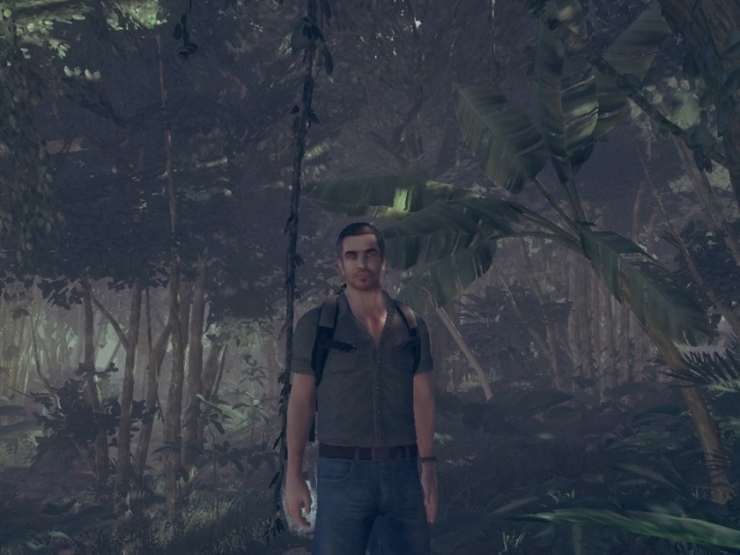
Multiplayer
This game's story is: You are Elliot. You must do this and that and so on. There's no "we" here - it's just a bunch of "them" and they are all NPCs. There's no multiplayer option in the game and the fact that it ends so fast barely allows you to feel this absence.
Conclusion
Maybe my review doesn't let you believe it, but Lost: Via Domus is not a failure. It will probably bring a pleasant experience to the die hard fans and it will definitely have some hot spots you will remember after the credits roll. It's just too short, it has an absolutely rubbish ending and it gets too repetitive and boring from time to time - and these are some real drawbacks. Still, this might be one of the best games created after a movie and at least that could be enough to suggest that you should give it a try.
 14 DAY TRIAL //
14 DAY TRIAL // 